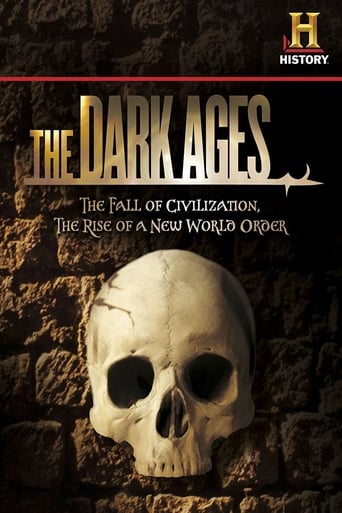


Horrible, fascist and poorly acted
... View MoreA brilliant film that helped define a genre
... View MoreA Brilliant Conflict
... View MoreGreat movie. Not sure what people expected but I found it highly entertaining.
... View MoreJust watched the Dark Ages from the History Channel. It was very well done and held my interest.However,I detected a serious historical error.Specifically, it stated with colored map that Poland was invaded and made part of Charlamagne's Empire.While some western Slavs on the west side of the Oder were subdued and became allies of Charlamagne ( Sorbs and Wilzians) ,which is now Germany,Charlamagne never conquered the land east of the Oder river which is now present day Poland. In the interests of accuracy I point out this error.Charlamagne Christianized mostly all of Western and Central Europe up to the Oder river by 813 but Poland remained pagan until the 10th century. Dr Marc
... View MoreConsidering that the film covers a period spanning many centuries, it's amazing that they thought they could cram it all into two hours, but the History Channel has tried! And, overall, it achieves a lot in less than two hours. However, to adequately encompass the Middle Ages, a series would seem in order, as the show was a bit episodic and moved way too fast.When the show begins, it's still the Roman era--one that the film seems to overly romanticize. Sure, it was advanced and organized--but it was also brutal and just plain evil. So, when Rome fell, I thought it was interesting that this was seen as a bad thing--as they had enslaved the civilized world. The show then jumps a bit in history to discuss the major events of the next 700 or so years. It hits most of the biggies such as Charlemagne, the Battle of Tours, plagues and the Vikings. It ends with the Crusades--an attempt by the Church to channel the cruel knights into more productive work.There were some things I really liked about the show. A few of the comments by the historians were pretty funny, such as the remark about a Viking named 'Skull-Splitter' as well as their accurate assessment of the role of knights (they were NOT chivalrous or gallant in the least). I also liked that the Vikings were not shown wearing horned helmets (a common myth). A few things I was less thrilled about was how sketchy the show was, how it never really talked about the life of folks during this time as well as it portraying the Battle of Tours--with what seems like about 30 men (when it actually had an estimated 60000 soldiers in the fight). Not perfect but if you MUST see 700 years of history shoved into less than two hours, it does about as good a job as you could expect.
... View MoreFirst let me say that this is a good documentary with accurate costumes and settings.The film leaves one believing that the Vikings simply retreated from Alfred "The Great" because of his defense mechanisms and no longer played a role in this part of history. While the raids on southern England did abate, Vikings continued to plunder northern Britain and northwest France.Left out of the documentary was the assimilation of the Vikings into Normandy with the Rollo and Charles "The Simple" agreement. In exchange for peace, the northwest portion of France was given to the Vikings with the condition that they also convert to Christianity. The six Dukes of Normandy were not even mentioned although they played a crucial role during this time period.This Viking settlement in northwest France ultimately led to the Battle of Hastings with William "The Conqueror" (a Viking descendant) defeating King Harold Godwinson to become the ruler of England. It is worth mentioning that immediately before the Battle of Hastings that Harold was fighting Viking marauders in northern England and his troops were probably somewhat battle worn and the battle may have had an entirely different outcome had this not been the case. I have wondered if it was possible that William may have planned the northern attack with his northern brethren to wear Harold down before the Battle of Hastings took place.All of this information was omitted with the documentary jumping from Alfred "The Great" directly to the Crusades, leaving out a lot of extremely relevant history that helped bring about the Crusades and the knowledge to end the Dark Ages.
... View MoreWe've probably all heard of the period in European history between the Roman Empire and the Renaissance. But unless we see this documentary, we can't even begin to understand how unpleasant it was (and what we see here is probably tame compared to how things really were). "The Dark Ages" shows how Rome's collapse led to the balkanization of Europe and the rise of the Catholic Church, then the Holy Roman Empire and the Vikings, and all the while a semi-successor to Rome was going on in Constantinople. Not to mention the Bubonic Plague.There is a brief look at how the Catholic Church and the monarchs were intent on forcing their religion on conquered people, but I think that the documentary could have looked more at how vile the Catholic Church got in its full-scale corruption. But the part about the Crusades was well done, in that it showed how the soldiers went over there with the aim of conquering the region but found a more advanced society (the Arabs were keeping alive the knowledge that the Catholic Church suppressed in Europe).Anyway, we get a sense of how the Dark Ages - or Middle Ages, if you want to call them that - led to the Renaissance. Hearing about some of what happened during the Dark Ages, it seems like in some ways, things haven't gotten much better: we still have wars, oppression, and disease. Can technological advancements really mean anything? Overall, I recommend this documentary.
... View More